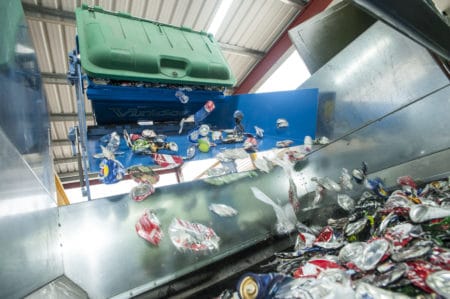Negotiations on the EU’s circular economy package next week are to focus on recycling targets and the way they are worked out.
The talks come as government ministers, with UK input, are expected to oppose the recycling rate levels proposed by the European Commission and Parliament.

The Circular Economy package will be adopted by EU member states – including potentially the UK – after agreement is reached between ministers, MEPs and the European Commission
The ‘trilogue’ discussions will begin on Tuesday (30 May) between the European Council, Commission and Parliament have the aim of reaching agreement on the package.
The ministers, through the European Council, agreed a negotiating stance on the Circular Economy Package last Friday (19 May), ahead of the negotiations. Discussions will centre on the proposed replacement targets and requirements for the existing ones which are contained in the current suite of EU laws on waste and recycling. This includes the Waste Framework, Packaging and Landfill Directives.
In a statement issued on Friday evening (19 May), the Council confirmed that it has agreed on a negotiating mandate to start talks on the package – which it said will focus on ‘binding targets and their calculation rules’.
Mandate
In the statement, the Council said: “Today’s Council mandate is the result of intensive work and discussions on all four proposals during three Council Presidencies (Netherlands, Slovakia and Malta). The Maltese Presidency has now obtained support to initiate talks with the European Parliament with a view to a possible first reading agreement. A first trilogue meeting is scheduled on 30 May.
“Negotiations are expected to focus on a number of outstanding elements, including the definitions, the setting of binding targets and their calculation rules, end-of-waste criteria, extended producer responsibility schemes and waste prevention.”
EU Council
Statement
“Negotiations are expected to focus on a number of outstanding elements, including the definitions, the setting of binding targets and their calculation rules, end-of-waste criteria, extended producer responsibility schemes and waste prevention.”
In March, MEPs voted on a series of amendments to the proposals, including an increased recycling target to 2030, upping the goal from a 65% level as backed by the European Commission, to 70% (see letsrecycle.com story).
Parliament
As well as voting for a higher recycling target, MEPs have also backed proposals to change the way in which progress towards recycling targets is measured – to adopt a ‘harmonised’ methodology for recording recycling across all EU member states.
letsrecycle.com understands that the Council is likely to seek a lower recycling target although the position on recycling definitions is not known.

Waste management firms have argued that the definition of recycling shoudl include a derogation that allows output from sorting plants, including MRFs, to be counted toward recycling targets
Different views exist on whether the EU should consider a material as having been recycled at the point at which it enters into the final recycling process, or if through a derogation, it can be counted at the point it leaves a sorting operation provided it is sent to a final recycling process.
The waste management industry – represented by the European Federation of Waste Management and Environmental Services (FEAD) and the Environmental Services Association (ESA) – have expressed a preference for an option to count recycling at the sorting stage, claiming that this ‘better reflects the realities of how recyclable waste is collected’ (see letsrecycle.com story).
Recyclers
However, organisations representing the steel, paper and non-ferrous metal recycling industries have issued a joint call for the EU institutions to “work constructively towards a single measure of recycling” without derogation.
Trade bodies including the Confederation of European Paper Industries (CEPI), The European Steel Association (EUROFER) and the European Association of Metals (Eurometaux) issued a statement on Friday claiming that allowing the derogation would provide member states with a ‘loophole’ to circumvent the legislation.
“…the Parliament has been the only institution to propose the right solution: a single measure without derogation.”
Axel Eggert
EUROFER
Axel Eggert, director general of EUROFER, said: “Every institution has now acknowledged that Member States need to start calculating recycling rates at the same point, which is not the case under present legislation. However, the Parliament has been the only institution to propose the right solution: a single measure without derogation.
“We’ll be working with policymakers to make the best of the proposals, and to aim for one measurement at the input point of the final recycling process. The worst possible outcome is one where we are left with a permanent loophole that allows Member States to circumvent requirements”.
The post Recycling definition in spotlight in EU waste negotiations appeared first on letsrecycle.com.
Source: letsrecycle.com Waste Managment



